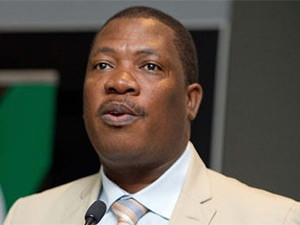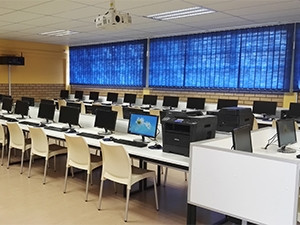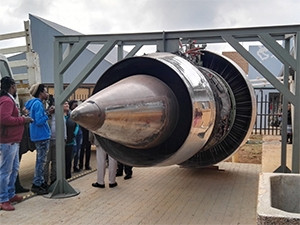
Previously dysfunctional Fontanus High School in Soweto has been revamped into a "learning facility of the future" with a core focus on subjects such as engineering, maths and science; ICT and commerce and entrepreneurship.
The school, which has been renamed the Curtis Nkondo School of Specialisation, is the first of 27 the Gauteng Department of Education (GDE) is reorganising into specialised facilities that offer technical and vocational content.
Speaking at the pre-launch event yesterday, education MEC Panyaza Lesufi said his department is changing Gauteng's historical reliance on the mining sector by changing the history of township education.
"That kind of economy is dying. Gauteng adopted what is called TMR (transformation, modernisation and reindustrialisation) whereby the entire province has been sub-divided into five key economic nodes.
"...Johannesburg is focused on ICT, commerce and entrepreneurship," he states.
Lesufi adds: "This is the first school to have multidisciplinary. It has all major components and the three being engineering, ICT and performing arts. We believe we need to take education in this province to a higher level, and this is one of our major projects by which we are doing this."
Worthy investment
Located at Emdeni Extension, Curtis Nkondo School of Specialisation will accommodate 390 grade eight and nine learners who will have access to computer labs, combi courts for netball, tennis, basketball and volleyball, a soccer pitch, a library as well as free access to the Internet.
For this year, the school will only accommodate grade eight and nine learners, with the intention to expand enrolment to grade 10 learners in the next year, progressing to incorporate other grades as well.

Each learner will receive a tablet device to enhance their learning experience, while each of the 19 school educators will receive a laptop to aid their educational process, says school principal Dr Mduduzi Mathe.
The school has been divided into five areas that will cater for the different disciplines at the school and each classroom has been equipped with an interactive smartboard. Although each class can accommodate as many as 40 learners, the ideal average per classroom is envisaged at only 20 learners.
The school also has an engineering workshop which houses a caterpillar and helicopter engine, as well as an automotive differential. Outside the engineering workshop is the engine of a Boeing 747.
"We are changing the history of township education so that we can invest in our learners knowing that when they leave here, they are not going to add to the list of those that are unemployed or the list of those applying for social grants or the list of those applying for an RDP house," explains Lesufi.
We are quite excited about this school, he adds. "Our excitement is beyond normal boundaries because all the schools that are closed in the townships, we want to convert them. We knew why parents left some of our schools to go to former Model C schools, so we want to build Model C schools here in the townships and this school represents that aspect."
According to the department, the complete refurbishment of the school cost R80 million.
School sponsors include South African Airways, Barloworld, MTN, NAT and Telkom. Through the Telkom sponsorship, learners will be taught about the evolution of communication in the country, says Lesufi.
"Our learners are going to be very competitive; the market is going to look for them. We've put in the investment, it's up to our learners to take advantage of this huge investment," he says.
Expert personnel
Deputy minister in the Department of Telecommunications and Postal Services, Hlengiwe Mkhize, has been vocal about the need for further training and development of South African teachers.
A learner's ability to gain access and understand digital content will depend on the teacher being comfortable with using technology devices in the classroom, she previously stated.

Lesufi notes to change the face of education in township schools, teachers need to be competent; which is why the department recruited educators for the school through TEACH South Africa (TEACH SA).
TEACH SA describes itself as an organisation that "recruits, trains and places highly skilled and motivated recent university graduates in the classroom".
All of the educators that have been recruited to teach at Curtis Nkondo School of Specialisation have a degree qualification above honours level, says Lesufi.
He says the department also recruited learners that will maintain the school's high stature. "When we say the stature is very high, this means we selected the best learners in science and maths, commerce and the performing arts. They also have a very strong socio-psycho support in terms of knowing about HIV/AIDS, drugs and even the Constitution of the country."
Safety and
While the GDE's efforts to provide modernised technologies in township schools have been commended, the department has also faced criticism for not providing sufficient security to prevent theft of smart devices.
The rollout of the GDE's "paperless classroom" initiative has experienced some stumbling blocks, with theft being the biggest challenge.
The paperless classroom is part of the department's plans to move matric learners from using traditional learning tools to smart devices. Earlier this year, the department said more than 100 smartboards were stolen from schools since the rollout of the ICT programme in July 2015, while some 8 000 tablets were reported stolen.
However, Mathe says there are no worries when it comes to the security arrangements for the Curtis Nkondo School of Specialisation.
"We've got top of the range security; even the community is involved. It's important for us to engage the members of the community so that we can look after the property," he says.
Share